Graham Reid | | 4 min read
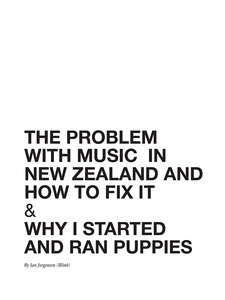
There was a drum kit set up and guitars in place. But no band.
About 11.15 two guitarists arrived and went to the bar where they chatted with friends and had a couple of drinks.
At 11.45 their drummer joined them.
It was looking promising until the drummer ambled off outside with a mate.
They eventually came on stage at 12.10.
And the band I wanted to see was on after these guys.
I went home.
This was, and still is, an all too common experience with local bands, especially young ones.
Now I get that they maybe don't live at home anymore so it's kinda cool to stay up late without Mum nagging. And I understand they may not have work or courses the following day. But most of us do.
During this period I used to repeatedly remind bands (among them my own kids who were in groups) that even though they and their mates might be unemployed (and there was high unemployment at the time) 90 percent of people were still working so had somewhere to go the following morning.
And waiting around for a few more people to turn up is self-defeating. Others leave or don't even bother going at all.
For many years I would tell bands that this practice did not happen overseas, in big places like New York and London. Bands there knew that people had to get the last bus or Underground/subway home, that the band might only be part of what people wanted to do that night . . . and in many places bands would go on at 8 or 9.
But that message still hasn't sunk in for most local bands.
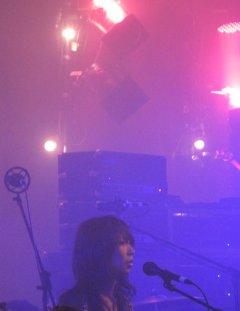 Just a few weeks ago I went to the
Kings Arms to see a band and arrived around 10pm to be told they
would come on about 11.30. And we know what that means.
Just a few weeks ago I went to the
Kings Arms to see a band and arrived around 10pm to be told they
would come on about 11.30. And we know what that means.
I went home and watched a movie, fully intending to go back. But do you think I did?
If you want to minimise your audience that is a sure way to do it.
I'm delighted therefore to read in Ian Jorgensen's opinionated and useful self-published book The Problem With New Zealand Music and How to Fix It & Why I Started and Ran Puppies that he feels the same.
So it's not just old folks like me who object to bands starting late.
Jorgensen – better known as Blink – offers plain speaking and common sense for bands and promoters: do a couple of shows a night in a club with the same bands (one kicks off at 7, the second at 11); have shows start early and on time; club owners jolly along the bands to make sure thy got on stage on time . . .
This is practical, simple and achievable.
And what he doesn't say but bands might also heed is if they play two shows a night – or better still get a residency, which Blink doesn't mention – then they will get better and better.
It might seem boring to mention the Beatles in this context, but why were they so good on stage and in the studio? Because even by the end of 1962 and with just one single behind them they had literally thousands of hours of playing time under their belts. They could just get up and do it.
My experience as an outside observer has been that bands here play half a dozen shows then need a cup of tea and a lie-down for six months.
Blink's book also argues the case for more venues and – as one who has done it – he offers practical tips for finding, starting and running a venue.
He discuses relationships with the police, neighbours and local authorities (they are actually your friends if you accommodate them) and liquor licensing.
He makes the case for more all-ages shows and how you can sidestep being held in the grip of the alcohol industry which has a lock on most venues. Bands go on late because bars want to sell more booze to waiting punters, we all know that. And he talks about costs in real terms. Actually dollar figures. Very useful.
 He got rid of door lists at his venue
Puppies (each band member gets to invite one guest, otherwise
rock'n'roll is pay-at-the-door) and addresses the mundane but
important matters like providing free wi-fi (“Holy shit do the
international touring artists appreciate this”), having paper and a
printer, a bit of food available for artists (he had a toaster, bread
and spreads in the green room although “this got gross when not
maintained enough”) and making the backstage are comfortable.
He got rid of door lists at his venue
Puppies (each band member gets to invite one guest, otherwise
rock'n'roll is pay-at-the-door) and addresses the mundane but
important matters like providing free wi-fi (“Holy shit do the
international touring artists appreciate this”), having paper and a
printer, a bit of food available for artists (he had a toaster, bread
and spreads in the green room although “this got gross when not
maintained enough”) and making the backstage are comfortable.
Simple stuff but important.
In another section he tackles the more complex issues, like taking to task the business end of New Zealand music (APRA and PPNZ, the latter now part of recordedmusic.co.nz along with RIANZ) and how much their fees are, where the money goes (or doesn't go) and why – he argues – songwriters are being ripped off.
It is contentious (among other things he argues for the end of the Silver Scroll Awards night which always seemed to me an important event/gathering for songwriters who otherwise work in isolation) but he raises tetchy points about where all that money collected from venues, shops, stores and so on which play music goes to. *
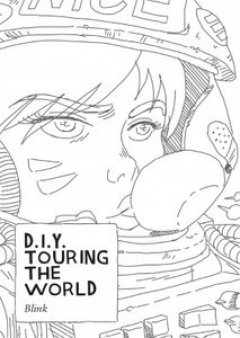 His argument is not just that much of
this money doesn't go to where it should (the artists, other than
those getting radio play) but that the costs for live music venues
are high and -- among other things -- necessitate door prices being higher than they should.
His argument is not just that much of
this money doesn't go to where it should (the artists, other than
those getting radio play) but that the costs for live music venues
are high and -- among other things -- necessitate door prices being higher than they should.
Frankly, some of the costs he outlines do not seem prohibitive to me (his language is furiously emotional) but he's as good as his word about keeping costs down.
This useful, sometimes insightful and provocative book is just $12.
I commend young band members to buy it, read it and start thinking about the bigger picture: there could be a larger audience than just those mates if they followed some of Blink's advice.
Start early and start on time. Not so difficult, is it?
This book and his earlier DIY Touring The World are available from here.
* From launch date Elsewhere has paid all the appropriate fees to legally post music and video tracks on this site. Can't remember how much it is exactly but it is more than a few hundred dollars.


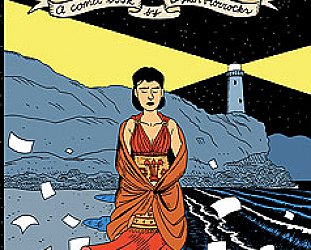
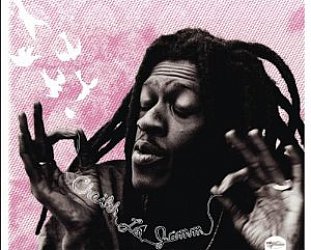

Gary Steel - Aug 5, 2014
Excellent review, Graham. This needed to be said, and it needs to be absorbed and acted on by participants in the local scene.
SaveFraser Gardyne - Aug 5, 2014
100% on the money Graham and great review. It's great also that Ian gets out there and shares his learnings. Hopefully some people take it on board because waiting around for hours for bands to get off there arses isn't what I call fun anymore. It's just rude...
Savenathan graves - Aug 6, 2014
I live in the UK but so often the case the venue wants to sell booze and keeps the punters waiting and refuelling.
SaveI like to see showtimes either printed on the venue door or online so punctuality can be disclosed to everyone.
the issue of performance royalties and where the money goes is a massive one. almost needs a full article .....the bigger acts invariably get paid as they are registered and recognised for radio and tv airplay but sadly the less organised or ' not on the radar' acts and songwriters will miss out on income owed. this is one of the big debates on PRO ( performance royalty organisations) globally. poor accounting and collection data.
Great work as always Graham..
post a comment